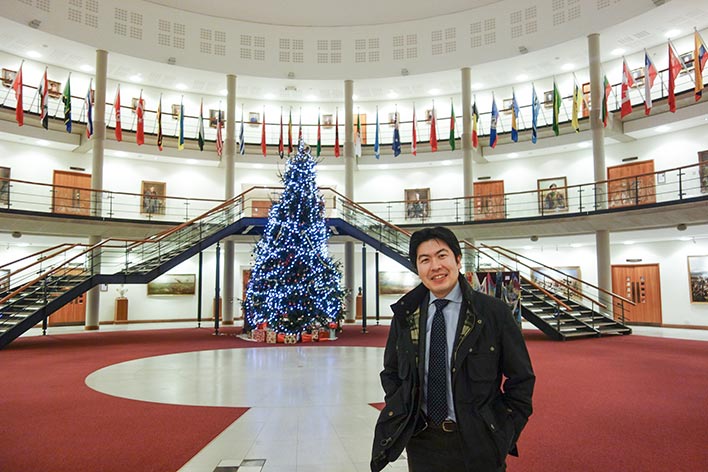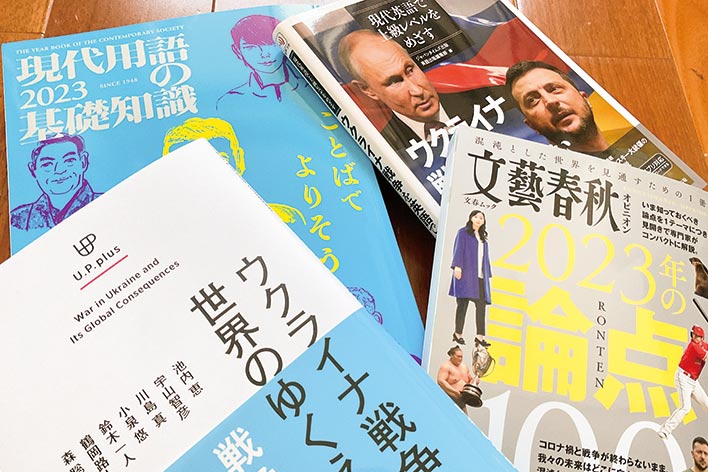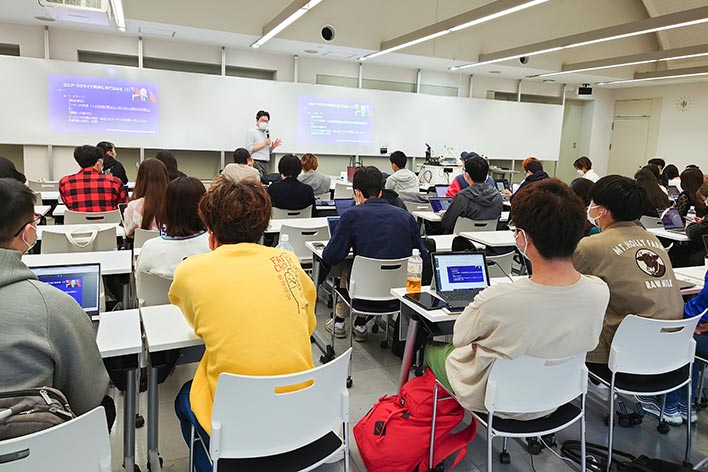#035
Analyzing contemporary
European politics and
international security
from a Japanese perspective
Michito Tsuruoka
Japanese Color:KONJO-iro
#035
Michito Tsuruoka
Japanese Color:KONJO-iro
MOVIE

Associate Professor
Faculty of Policy Management
Amid the COVID-19 pandemic, Russia launched an illegal and unprovoked invasion of Ukraine in February 2022,triggering a succession of problems and crises in Europe and on a global scale,including high inflation and energy and food crises.
Experts cannot solve all those problems. But the need for expertise on such areas related to international security,geopolitics and geoeconomics is increasing. Associate Professor Michito Tsuruoka,an expert on contemporary European politics and international security,is thinking about how he could help make the world a better place.
International relations (IR) is a study area focusing on relations among nations, including regional dynamics and international institutions and frameworks. I am mainly working on contemporary European politics – not least European Union (EU) politics and European security, including the North Atlantic Treaty Organization (NATO) – and international security, such as alliance politics and deterrence.
I have been closely following Russia’s invasion of Ukraine. Been deeply shocked personally, yet I have been trying to offer informed analysis of the war and its foreign policy and political implications based on my expertise in European politics and international security both to the Japanese and international audiencs. I believe it is part of my duty as an IR scholar.
Working on the same topic for a long time makes it possible to compare similarities and differences between what happens today and previous cases. For Ukraine, this is not something that suddenly started in February 2022. Russia invaded Crimea and the Donbas region back in 2014. In a similar manner, while NATO is now rapidly strengthening its deterrence and defense posture vis-à-vis Russia, the alliance had been undergoing transformation at least since 2014. Having a broader perspective, in terms of both time and the geographical and functional scope is something we always need.

Tokyo did not want to see Britain leaving the EU. Yet that was something the British people chose and Japan needed to safeguard the country’s mainly economic interest amid the Brexit chaos. For a long time, Tokyo was using the UK as a “gateway” to the EU. Many Japanese companies invested in the UK and exported products to the European market, taking advantage of the single market of the EU. In foreign policy and security terms as well, it has long been Tokyo’s habit to talk to London rst, and then to Paris, Berlin and Brussels. After Brexit, Britain can no longer be relied on as a gateway to the EU, which means that Tokyo needs to somewhat rebalance its policy towards Europe and look for new gateways.
At the same time, however, the value of the UK as a security and defense partner for Japan has not been quite affected by Brexit, as those elds are largely outside the EU’s competences anyway. The UK sent its brand new aircraft carrier – HMS Queen Elizabeth – to the Indo-Paci c region, including Japan, in 2021 and Japan and the UK have been conducting a number of joint training and exercises in recent years. The announcement in December 2022 about the joint development of a next generation jet ghters (GCAP) among Japan, the UK and Italy represents another milestone in the development of the strategic relationship involving the post-Brexit UK.
Japan and Europe are getting closer also in the context of the war in Ukraine. Tokyo is committed to help Ukraine resist Russia’s invasion and impose sanctions on Russia, emphasizing the linkage between the European and East Asian theaters. Prime Minister Kishida argues that Ukraine today could be East Asia tomorrow.

It is often said that there are no national boundaries in the academic community. I do not really think that is the case. And I do not necessarily think that is a problem. It is just a reality that different people have different perspectives and researchers’ job includes responding to local demands and expectations in terms of research, policy work, education and public outreach. Since the start of the war in Ukraine in February 2022, I have given numerous interviews to the Japanese media and appeared on TV and radio news programs. What the local audience need and want to know in Japan are, not surprisingly, often different from those in Europe and the United States. Following Russia’s invasion of Ukraine, many Japanese for the rst time have thought about what it takes to defend the country and the people in case of military contingency.
As for academic research as well, I do not think I should do European studies the same way as my European colleagues. Even assuming that I am capable of doing it, I do not think that would be my best contribution to the discipline. I believe I could make a bigger contribution as a Japanese scholar, bringing different or external perspectives to the table.
What I am now pursuing instead is something that could be called “European studies of the Japanese, by the Japanese, for the Japanese.” This is also about taking full advantage of what I possess, including the Japanese language. The degree of national boundaries varies among different disciplines. Politics, foreign and security policy and national defense, not least qualitative and policy-oriented research on those areas, are where national boundaries matter more than in quantitative research.


Michito Tsuruoka
Associate Professor, Faculty of Policy Management, Keio University. Dr. Tsuruoka graduated from the Faculty of Law, Keio University, He studied at Georgetown University (US), and earned a PhD (in War Studies) from King’s College London (UK). Before assuming his current position in 2017, he served in a number of positions, including: advisor at the Embassy of Japan in Belgium; resident fellow at the German Marshall Fund of the United States (GMF); senior research fellow at the National Institute for Defense Studies of the Ministry of Defense; and visiting fellow at the Royal United Services Institute for Defense and Security Studies (RUSI).

2023.Mar ISSUE